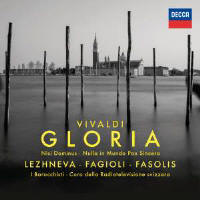Texte paru dans: / Appeared in: |
|
|
Reviewer: Berta
Joncus Here Decca brings its top Baroque soprano, Julia Lezhneva, together with Deutsche Grammophon’s top countertenor, Franco Fagioli, to perform a collection of Vivaldi’s sacred hits. Star power is not, however, enough to achieve effective lift-off. The performances satisfy, rather than move. Crisp tempos, disciplined ensemble, and solo improvisations both vocal and instrumental unleash the tremendous energy of the choir-and-solo Gloria. Outer movements, edged with trumpets and the choir’s marcato exclamations, are sublime. But what about the petition ‘O Lamb of God’? The movement’s drama lies in pauses, like those of a spoken plea; instead, we get towering homophony from the Coro della Radiotelevisione Svizzera. Vivaldi wrote for an all-girl choir – but apart from Lezhneva’s very gorgeous ‘Domine Deus’, fragility is banned from this Gloria. Director Diego Fasolis gives Fagioli license to swell rather too often. Fagioli ladles on the drama even more in his Nisi Dominus. His fans may enjoy it, but this solo psalm-setting wasn’t built for such extremes. Take for example the aria ‘For so he giveth his beloved sleep’: a throbbing siciliano, it asks for the simplest, most whispered address possible. Here Fagioli builds to his top note as if in a bravura aria. Readings by other countertenors – Andreas Scholl, David Daniels, Philippe Jaroussky – show the clumsiness of Fagioli’s approach. Conversely, Lezhneva is too cool in her solo motet Nulla in mundo. Her coloratura, matchless in its velocity and precision, is detached, like birdsong. She wraps the words of her siciliano, regardless of meaning, in a single limpid tone. Glorious singing, yes, but the heart is missing.
| |
|
|
|
|
|
|
|
Cliquez l'un ou l'autre
bouton pour découvrir bien d'autres critiques de CD |
|



